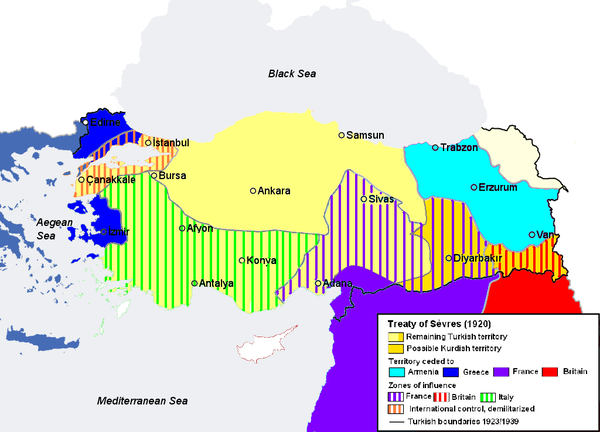The Treaty of Sevres
The Treaty of Sèvres was one of a series of treaties signed by the Central Powers after World War One. It ordered the partitioning of the Ottoman Empire, which led to its ultimate annihilation. The treaty, which liquidated the Ottoman Empire and virtually abolished Turkish sovereignty, greatly angered the Turkish.
Signed on 10 August 1920 following 15 months of planning, the Treaty of Sèvres was designed to strangle the ‘Sick Man of Europe’. Italy, Britain and France signed it on behalf of the victorious Allies.
The Treaty of Sèvres divided the territory of the Ottoman Empire in the Middle East.
France took over Lebanon, Syria and territory in southern Anatolia, while Britain took possession of Palestine and Iraq, gaining generous oil concessions in the process.. These terms were decided in the secret Sykes-Picot Agreement of 1917.

Armenia was recognised as a separate sovereign state.
The Treaty of Sevres also recognised certain areas as independent sovereign states. This included the Kingdom of Hejaz and Armenia.
Greece was given control of Smyrna, although it technically remained within the Ottoman Empire. The people of Smyrna were also given the option of a referendum on whether the wanted to remain in the Ottoman Empire or join Greece.
Italy was given the Dodecanese Islands as well as influence in the coastal region of Anatolia.
The treaty made the Dardanelles Straits an international waterway and stripped the Ottoman Empire of its control over it. It also declared some ports near Constantinople international ‘free zones’.
Kurdistan was a point of contention in the treaty. Nationalist Kurds rejected an initial agreement on the boundaries of Kurdistan as it did not include a region called Van.
Similar to the other treaties signed by the Central Powers, the Treaty of Sèvres imposed severe military restrictions on the Ottoman Empire.The Ottoman Army was reduced to 50,000 men, it was forbidden to have an air force and the navy was reduced to only thirteen boats. Under the Treaty of Sèvres the Allies were given power to impose these terms.
The Treaty of Sevres imposed equally as harsh financial terms on the Ottoman Empire. However, while Weimar Germany was allowed to control its own economy, the Allies were responsible for the Ottoman Empire’s finances. It took control of imports and exports, the Ottoman Bank, the national budget and requests for loans and reform of the tax system.
The Turkish nationalist leader organised a rebellion against the treaty just before the Grand Vizier, Ahmed Pasha, of the Empire ratified it. Pasha was defeated and Kemal refused to sign the treaty, which he saw as needlessly harsh.
Kemal argued that the treaty punished the people of Turkey and not the leaders of the Ottoman Empire who had led the country into war. As a result, the Allies and newly formed Turkey had to begin negotiations again.
See also: The Treaty of Trianon
MLA Citation/Reference
"The Treaty of Sevres". HistoryLearning.com. 2026. Web.
